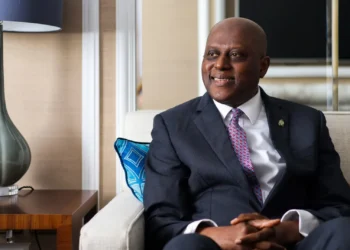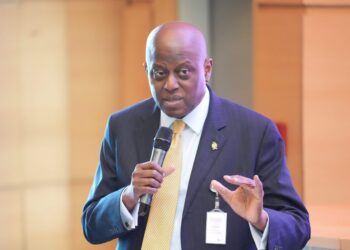Nigeria’s external reserves have increased yet again, reaching $37.05 billion as of July 18, 2024.
This is according to the Governor of the Central Bank of Nigeria (CBN), Yemi Cardoso, at a press briefing at the end of the 296th Monetary Policy Committee (MPC) meeting in Abuja on Tuesday.
Cardoso noted that the external reserves rose from $34.70 billion as of the end of June 2024 to $37.05 billion, which is an increase of $2.35 billion in about 18 days.
The communique read by the CBN governor during the press briefing noted: “As of July 18, 2024, external reserves stood at US$37.05 billion, compared with US$34.70 billion as of June 2024. This represents eleven (11) months of import cover for goods and services.”
Nairametrics further observed that the foreign exchange (FX) reserves are at the highest level since January 26, 2023, when it was $37.07 billion. This means that the external reserves are currently at a 17-month high.
However, checks by Nairametrics show that the CBN website puts gross reserves at $35.93 billion as of July 18, 2024, and $36.01 billion as of July 19, 2024, less than what the CBN governor presented.
What you should know
- The Monetary Policy Committee (MPC) recently urged the CBN to focus on boosting the external reserves.
- To ensure a steady flow of foreign exchange into the country, the CBN plans to double the diaspora remittance inflow this year.
- Nairametrics earlier reported that the CBN disclosed a 39% increase in inflows through International Money Transfer Operators (IMTOs) for the first quarter of 2024 compared to the same period in 2023. This is according to data from the quarterly statistical bulletin of the CBN for the first quarter of 2024. The total inflow for the first quarter of 2024 amounted to $1.07 billion, marking a 39% increase from the $770.23 million recorded in the same period of 2023.
- When comparing Q1 2024 to the last quarter of 2023, which saw total inflows of $965.82 million, there is an increase of about 11%.
- Recent reforms implemented by the CBN aimed at attracting more dollar supply through IMTOs seemed to have triggered the increase.
- Also, Afrexim Bank earlier announced the disbursement of $925 million- another tranche of the $3.3 billion crude oil-backed loan agreement it entered into with the NNPC last year. The bank disclosed this in a statement on its website stating that the current disbursement brings the total payment for the facility to $3.175 billion. This loan is expected to help stabilize the forex market in light of the severe volatility.
- The World Bank also recently approved $2.25 billion in loans to Nigeria to boost the country’s economic stability and support its vulnerable populations. This financial infusion is intended to provide immediate financial and technical support for Nigeria’s urgent economic stabilization efforts.
- Nairametrics exclusively reported that the World Bank disbursed $751.88 million to Nigeria from a recently approved $1.5 billion loan. According to findings by Nairametrics, the amount was disbursed under the Nigeria Reforms for Economic Stabilization to Enable Transformation (RESET), Development Policy Financing Program (DPF) project. This loan project is a part of the broader $2.25 billion approved by the World Bank for Nigeria on June 13, 2024, to boost reforms in the country.



















